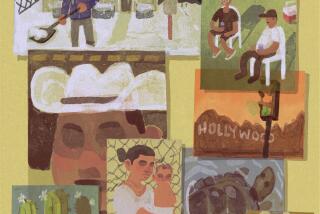An Ugly Duckling Sheds His Hometown : CITY LIMITS: Memories of a Small Town Boy, <i> by Terry Teachout,</i> Poseidon Press, $19; 204 pages
- Share via
Here are 15 essays in search of a title or an overriding theme and I think the “Small Town” theme may have been the wrong one to pick.
Terry Teachout was raised in Sikeston, Mo.--that’s perfectly true. He did end up living in New York City--that’s perfectly true, too. But, more to the point, these are “Ugly Duckling” essays, coming-of-age stories, identity vignettes.
Imagine an ungainly swan who knows he doesn’t belong with all these small-town ducks, but once he finds himself with the suave swan flock, he longs for the other pond, and the ducks, whence he came. At the beginning of this memoir, we see young Terry Teachout, Midwestern college rube, venturing by himself to the Cafe Carlyle, on a weeklong trip to Manhattan, to hear Bobby Short. That chivalric musician, recognizing the out-of-towner--or perhaps a fellow swan--comes over to say hello.
From then on we get a few portraits of Sikeston, Mo. Some of them fall curiously flat. Sometimes Teachout gets a little sugary. Here he is alone at Christmas, remembering his hometown: “Though the only ornament in sight was the cookie tin resting in my lap, a scrawny tree blazed merrily away in the corner of the room; though my loved ones were a thousand miles away, they sat beside me on the couch, lifting my heart with their presence. I said a silent prayer of thanks and went to bed a happy man.”
But another darker, more contemplative voice shows up in “City Limits.” Young Terry is desperately shy. He only begins to find himself in music--playing the fiddler on the roof in a high school production of “Fiddler on the Roof,” learning to play bass, finding other musicians who make up the group Sour Mash, good enough to play at local bars on weekday nights.
In other words, by the time he’s in college, he finds companeros who speak his language; he gets his inner life. He learns the wonderfulness of jazz, and that first mention of Bobby Short gains new resonance. And Teachout finds an unlikely piano player in a Shakey’s Pizza who uncannily reproduces both the notes and the style of the legendary Art Tatum. There follows from this a secret sense of kinship of being on to something . (As one who has heard Art Tatum, in Hollywood, shortly before he died, this reader, at least, gets it. Out of the cornfields, and into the Mystic.)
But how do you take that sense of the special, the sacred, and translate it into your real, your adult life?
Teachout is early rejected as a reporter by the Kansas City Star, and though he’s found a sweet wife, his 20s are taken up with desperation and wrong turns. He’s a bank teller, a graduate student in psychology, a worker on a crisis hot line, but he’s numb, he despairs, he’s on the wrong track. He loves music but isn’t cut out to be a professional musician. He should have been a writer, but he’s been rejected. He’s as depressed as a rat in a very little maze, and a brilliant essay on the racism which so often accompanys numbing frustration chillingly illustrates this.
This is where so many unlucky people end up, in jobs they hate, in places they hate, and those around them suffer from it. But in the penultimate essay here, Teachout gets his chance, finds his place, moves to Manhattan, goes to work for Harper’s magazine. It’s the happiest ending there is, when a man (or a woman) finds his (or her) real and proper life.
“City Limits” comes in the form of a gallant apology. Teachout loved his hometown, was crazy about his family. But music and language saved him from Sikeston.
The moment when he climbs out of Grand Central Terminal in Manhattan (“I took the great marble stairs two at a time and gazed at the vaulting ceiling and the twinkling beads of light far above my head”), will roll right off every duck’s back, but give every would-be swan a delicious, unreasonable chill of recognition.
Next: Don Cook reviews “Ten Days to Destiny” by John Costello (William Morrow) .
More to Read
Sign up for our Book Club newsletter
Get the latest news, events and more from the Los Angeles Times Book Club, and help us get L.A. reading and talking.
You may occasionally receive promotional content from the Los Angeles Times.









